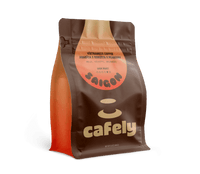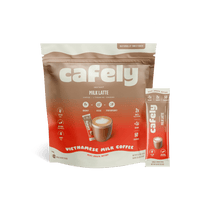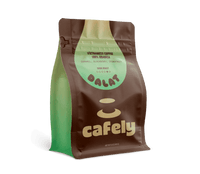Ever wake up tired even after a full night’s sleep? Plenty of people hit seven to nine hours and still drag through the day like they’ve been up all night. It's not always about the quantity of sleep; sometimes, the problem lies elsewhere.
Your daily habits — what you eat and when you move — can either keep your energy humming or drain your tank dry. But you don’t need to overhaul your life or chug six coffees a day to feel better.
In this guide, we’ll break down 25 natural, practical ways to boost your energy without taking a midday nap.
25 Ways to Boost Your Energy Naturally
Your energy levels are surprisingly responsive to change. With the right adjustments, you can train your body and brain to feel more alert more often. Below are 25 natural strategies to help you do just that, divided into categories to make things easy to navigate and put into action.
1. Eat Regular, Balanced Meals

Skipping meals or going too long without food can leave your energy levels tanked by midday. To keep your body fueled and your brain sharp, aim to eat something every three to four hours.
Each meal should include a mix of complex carbs (like quinoa or brown rice), lean protein (chicken, tofu, eggs), and healthy fats (avocado, olive oil, nuts). This trio helps slow digestion just enough to keep your blood sugar stable and your energy even.
2. Opt for Low Glycemic Index Foods
Some carbohydrates give you a gentle, sustained boost. Others give a quick boost of energy but fizzle out fast. Low glycemic index foods fall into that first category, delivering energy at a slower, more manageable pace.
Instead of reaching for white bread or sugary snacks, pick foods like lentils, oats, and sweet potatoes. These slower-burn choices will help you avoid the dreaded afternoon slump.
3. Incorporate Iron-Rich Fruits
If you’re dragging your feet despite decent sleep and hydration, iron could be the missing piece. Dried fruits like apricots, prunes, and raisins are a robust source of plant-based iron. Toss them into oatmeal, trail mix, or salads to prevent low iron levels, which can contribute to persistent fatigue.
4. Stay Hydrated
Mild dehydration can cause symptoms such as brain fog and low stamina and even make some people grumpy. Rather than waiting until you're thirsty, make hydration a habit in the background. Sip water throughout the day and pair it with meals. Herbal teas, infused water, and high-water foods like cucumbers and oranges can also help keep your energy up.
5. Limit Caffeine Intake
A morning coffee or two is fine, but when excessive caffeine creeps into your afternoons, it can mess with your energy and sleep cycle. Instead of a late-day latte, try switching to herbal tea or sparkling water. You’ll avoid the jittery crash and give your body a better shot at winding down naturally.
Physical Activity: Energize Through Movement
Physical activity gets your blood flowing, lifts your mood, and helps shake off mental fog. Even small bursts of movement throughout the day can reset your system and leave you feeling more awake.
6. Engage in Regular Exercise
Even light to moderate movement can boost your energy levels in a big way. A daily brisk walk, casual bike ride, bodyweight exercises, or other consistent physical activity encourages better circulation and helps regulate your internal energy rhythms. It’s less about intensity and more about showing up regularly. Just 20 to 30 minutes a few times a week can make a noticeable difference.
7. Practice Yoga or Tai Chi

Gentle movement practices, such as yoga or tai chi, can awaken both the body and mind. They support balance, flexibility, and focus, and can dial down the kind of background stress that quietly drains you. Plus, the mindful breathing involved acts like a built-in reset button for your nervous system.
8. Take Short Walks
Stepping away from your desk or couch, even for five minutes, can completely shift your mental and physical state. A quick walk outside brings fresh oxygen and breaks up long periods of stillness that can leave you feeling stagnant. These mini-breaks fight fatigue by preventing it from building up in the first place.
Stress Management: Calming the Mind
When your mind is tense, your body follows, and energy is the first casualty. Chronic stress quietly chips away at focus, motivation levels, and physical stamina. Learning how to manage it improves your mood and frees up mental space and energy that stress tends to hijack.
9. Practice Relaxation Techniques
Mindful practices like deep breathing, meditation, or progressive muscle relaxation can interrupt the body’s stress response before it snowballs. These methods encourage your nervous system to switch out of “fight or flight” mode and into a more restful, restorative state. Even five minutes a day can lighten the mental load and help you feel more present and alert.
10. Seek Social Support
You don’t have to handle everything on your own, and trying to often adds to your exhaustion. Connecting with people you trust through a quick chat or regular check-in creates emotional relief. Supportive conversations can offload stress, offer perspective, and remind you that you’re not carrying your load alone.
Sleep Hygiene: Quality Over Quantity
Getting a certain number of hours of sleep is most people’s goal, but getting restorative sleep is what you should aim for. Even if you technically sleep “enough,” poor habits around bedtime can leave you groggy and drained. By improving your sleep environment and sticking to a rhythm, you help your body tap into deeper, more energizing rest.
11. Maintain a Consistent Sleep Schedule
Keeping a steady sleep cycle trains your internal clock to work for you, not against you. When you go to bed and wake up at roughly the same time each day, even on the weekends, your body starts to anticipate rest and wakefulness more efficiently. That rhythm leads to deeper sleep and smoother mornings.
12. Create a Restful Environment
Your bedroom should signal to your body that it’s time to power down. Dimming the lights, reducing noise, and keeping the temperature cool can set the stage for uninterrupted rest. Small changes like blackout curtains, white noise machines, or ditching the screens before bed can transform your nights into actual recovery time.
Natural Supplements & Herbs
Certain natural herbs have scientific backing for their energy-boosting potential. When used wisely, supplements like ginseng, ashwagandha, and Rhodiola rosea offer an extra edge, especially when stress or fatigue is a factor.
13. Consider Ginseng
Used for centuries in traditional medicine, ginseng is often a go-to when energy feels low and mental clarity starts to dip. Its active compounds, called ginsenosides, are thought to support stamina, sharpen focus, and ease mental fatigue.
While research is still evolving, several studies suggest it may help people feel drained, especially during periods of chronic stress or burnout [1]. If you’re looking for a natural lift without the crash of caffeine, ginseng might be a great herb to explore.
14. Explore Ashwagandha
Ashwagandha is like a stress-buffer in pill form. It’s an adaptogen that helps your body stay calm under pressure, and calmer minds often mean calmer energy.
People taking ashwagandha supplements reported feeling less tired, sleeping more deeply, and feeling less stressed [2]. If you’re feeling the pressure of juggling deadlines and family life, adding ashwagandha to your routine might be a gentle, natural lift.
15. Try Rhodiola Rosea
Rhodiola, or the "golden root," has been used in traditional medicine for centuries across Europe. Another adaptogen which thought to improve your ability to handle stress, mentally and physically [3]. For some, it has helped improve stress-induced fatigue and burnout, improving endurance only after a few weeks of use.
Lifestyle Adjustments
Tweaking every day habits can refresh your energy more than you might expect. Something as simple as what you sip at dinner or how you handle your workload can ripple out and reset your day.
16. Limit Alcohol Consumption

Even moderate evening drinks can make your sleep feel deceptively deep, while subtly fragmenting it in the back half of the night. That disruption often leaves you restless or foggy the next day.
Cutting back or avoiding alcohol close to bedtime can help your sleep feel restorative and improve your energy levels when you wake up.
17. Avoid Smoking
Tobacco use can interfere with deep and REM sleep while raising carbon monoxide levels in your body. This reduces the oxygen available in your blood, which saps away energy [4]. Plus, nicotine acts like a stimulant, which can make falling asleep feel impossible for some. Quitting or cutting back improves long-term health, and it can give your daily alertness a boost, too.
18. Manage Workload
Are you facing a never-ending task list? Delegating, saying no when needed, and prioritizing what really matters can reduce stress and conserve your energy.
The American Psychological Association recommends setting clear work boundaries around time and tasks to fend off burnout. That way, you’re using your mental bandwidth on what needs it and not draining it on what doesn’t.
Environmental Factors
Your surroundings play a bigger role in your energy than you might think. Light, scent, and air quality — they all send subtle signals to your brain and body about how awake (or drained) you should feel. Shifting your environment can be a low-effort way to get a quick lift.
19. Increase Natural Light Exposure
Morning light is one of the most powerful cues for waking up your internal clock. Spending time outside early in the day or working near a window can help regulate your circadian rhythm, improving both alertness and sleep later on. If your home has few windows, a short walk in the sunlight can be enough to shift your energy upward.
20. Incorporate Energizing Scents
Scent has a direct line to the brain’s emotional and memory centers, which is why certain aromas can spark an instant mood shift. Peppermint, citrus, and eucalyptus are commonly linked with increased alertness and reduced fatigue. Try a few drops of essential oil or a diffuser at your desk to help wake up your senses without caffeine.
Mental Stimulation
A lack of novelty or excitement can quietly drain your motivation, leaving you in a fog even after rest. Keeping your mind engaged is one of the most overlooked ways to feel more alive and alert.
21. Engage in New Activities
Trying something unfamiliar, like learning a language, picking up an instrument, or tackling a puzzle, gives your brain a jolt of stimulation. “Stretching” your brain with these mental tasks often results in sharper focus and more energy. It doesn’t have to be intense, as small shifts in routine can break the monotony and spark curiosity.
22. Listen to Uplifting Music
The right playlist can shift your entire mindset. Music activates several areas of the brain at once, triggering dopamine release and lifting your mood. Upbeat pop, instrumental jazz, DJ setlists on YouTube, or other music that energizes you can serve as a fast and accessible reset.
Nutrient Timing
You’re already thinking about what you eat, but have you considered that when you eat can be just as important for keeping energy levels stable? Timing your meals and snacks to match your body’s needs can prevent blood sugar dips and reduce fatigue, helping you stay focused throughout the day.
23. Eat a Nutritious Breakfast

Skipping breakfast might save time, but it often backfires when energy crashes mid-morning. A balanced first meal with grains, proteins, and healthy fats can help stabilize blood sugar and kickstart your metabolism. Starting your day with real fuel gives your brain and body a strong foundation to work from.
24. Include Protein-Rich Snacks
If you go too long without food, you may be draining your focus and mood. To keep energy consistent between meals, reach for snacks that include protein. A handful of almonds, a boiled egg, or some plain Greek yogurt can help curb hunger and release energy at a slower, more reliable pace than sugary options.
Mindful Practices
Sometimes the most powerful energy shifts come from within. Slowing down and paying attention rather than constantly pushing forward can recharge you in a way that’s both mental and physical. These moments of awareness don’t require much time, but they can shift your entire outlook.
25. Practice Gratitude
Turning your focus to what’s going right can create a surprising lift in mood and motivation. Research shows that regularly practicing gratitude is linked to better mental health and a reduction in stress, which supports more consistent energy levels [5]. Techniques like jotting down a few good moments each day or pausing to reflect during times of frustration can help reframe your day with a little more positivity.
10 Health Problems That Can Cause Lack of Energy
Persistent tiredness might be your body’s way of signaling deeper issues. We’ll take you through ten common health conditions that can zap your stamina, along with what causes the fatigue and how to recognize each one.
1. Anemia
One of the most common medical reasons behind persistent fatigue, anemia often stems from iron deficiency, which leads to a reduced red cell blood count. Without enough oxygen circulating to your muscles and brain, you end up feeling wiped out even with rest.
This condition tends to show up more frequently in menstruating or pregnant women, vegetarians, and people with chronic illnesses.
2. Hypothyroidism
Hypothyroidism, or an underactive thyroid, can leave you feeling sluggish or mentally foggy. Thyroid hormones help your body regulate metabolism. When production slows down, so does nearly every function in your body.
If you’ve experienced sudden weight gain, dry skin, cold intolerance, and low mood — alongside ever-present fatigue — you may be suffering from hypothyroidism.
3. Depression
If you’re constantly drained, feeling down, and can’t sleep well, it may be more than burnout; it could be depression. This condition affects motivation, concentration, and physical energy, often creating a cycle of fatigue that feels impossible to break. Symptoms typically include changes in appetite, persistent sadness, and a deep disinterest in everyday life.
4. Sleep Apnea
Interrupted sleep is a big problem. That’s exactly what happens with sleep apnea, a condition where breathing repeatedly stops during the night. Even if you’re “asleep” for hours, those disruptions prevent your body from getting into deep, restorative rest. Loud snoring, gasping for air, or waking up groggy despite a full night in bed are common red flags.
5. Chronic Fatigue Syndrome (CFS) / ME
Some people describe CFS as “the flu that never ends.” No amount of rest seems to fix the exhaustion. Often triggered by infections or immune irregularities, CFS disrupts your body’s ability to generate and recover energy.
Beyond the fatigue, you may also experience brain fog, muscle pain, and energy crashes after even minor exertion.
6. Diabetes

Behind the scenes, diabetes messes with how your cells access fuel. When insulin isn't doing its job properly, glucose can't enter the cells to be used for energy, leaving you feeling constantly run down. Symptoms go beyond fatigue; signs include excessive thirst, blurry vision, and frequent trips to the bathroom.
7. Vitamin B12 Deficiency
Vitamin B12 deficiency affects tons of older adults, and the symptoms can sneak up on you. Without enough B12, your red blood cell production and nerve function begin to decline, often leading to fatigue, tingling in the limbs, and memory problems.
This deficiency is more common in vegans, older adults, and people with absorption issues like celiac or Crohn's Disease.
8. Heart Disease
With heart disease, your heart struggles to deliver oxygen, even while you try to keep up with normal daily tasks. When your heart isn’t pumping efficiently, the muscles and brain don’t get the oxygen they need. This can result in exhaustion and weakness. You may also notice swelling in your feet, shortness of breath, or mild chest pain.
9. Anxiety Disorders
Living in constant tension wears you down. Anxiety disorders often come with racing thoughts, muscle tightness, poor sleep, and an overstimulated nervous system. All of these issues contribute to deep, lingering fatigue.
10. Infections (e.g. Mononucleosis, COVID-19, Lyme Disease)
Don't overlook past-infection fatigue. Things like mono, Lyme disease, or lingering cases of COVID-19 can drain you. Your immune system diverts a huge amount of energy to fight off these invaders. That can leave you with body aches, brain fog, and a level of tiredness that can linger long after the fever's gone.
Low-Caffeine + Adaptogen Boosts
Sometimes, what you pair with your morning coffee can make all the difference. Combining low doses of caffeine with adaptogens — natural substances that help your body manage stress — can create a smoother, longer-lasting lift.
Instead of the jittery spike-and-crash effect you might get from coffee alone, these additions offer calm, focused energy that’s easier on your nervous system.
1. Ashwagandha
Calming cortisol and stress, ashwagandha smooths out coffee’s edge without dulling its wakefulness [2]. Outside of its stress-relief properties, this ancient herbal remedy has also shown promise in supporting clearer cognitive function. This makes it a perfect combination with coffee, helping to minimize the anxious feelings that are a common side effect of the beverage.
2. Rhodiola Rosea
If you're looking for physical endurance or mental sharpness, rhodiola might be the ideal complement to caffeine. Known for helping reduce fatigue and improve stamina, Rhodiola works synergistically with caffeine, improving anaerobic performance like grip strength, bench-press power, and oxygen consumption more than either supplement alone [6].
3. Cordyceps Mushroom
Cordyceps supports stamina by improving cellular energy levels by boosting adenosine triphosphate (ATP) production, which is the molecule your cells use for energy [7]. At the same time, it may also improve how efficiently your body uses oxygen, especially during physical activity.
When combined with caffeine, you'll potentially get a more balanced energy boost, meaning fewer jitters with a reduced crash potential.
4. Lion’s Mane Mushroom

This nootropic mushroom helps your brain grow and repair nerve connections by stimulating nerve growth factor, which has been linked to better memory and focus [8]. Taken alongside caffeine, it can amplify mental alertness while tempering caffeine’s sharper edges. So you’ll have smoother, more sustained clarity.
5. Maca Root
Known for its ability to support stamina, mood regulation, and hormonal equilibrium, maca root blends well with caffeine by offering a gentle energy lift [9]. This combination can potentially help you avoid the crash or jittery effect you feel from coffee alone.
Red Flags: When to See a Doctor About Low Energy
If energy starts to feel like a constant, nagging presence, one that rest, food, and fresh air can’t seem to fix, it’s worth looking deeper. Some forms of fatigue are your body’s way of saying something’s off. Catching those signs early can make a real difference in your daily life.
Here are some signals that indicate it’s time to talk to a doctor:
- Fatigue lasting more than two weeks — If tiredness hangs around despite your best efforts to rest and recover, it could be more than burnout.
- Sudden or severe fatigue — A dramatic dip in energy, especially if it comes out of nowhere, shouldn’t be brushed off.
- Fatigue with weight loss — Losing weight without trying, paired with ongoing fatigue, may indicate an underlying illness that needs attention.
- Shortness of breath, chest pain, or heart palpitations — These can be signs of heart or lung issues.
- Fatigue with depression or mood changes — When low energy comes with irritability, sadness, or apathy, mental health could play a role.
- Sleep disturbances (snoring, gasping, insomnia) — Poor sleep quality caused by conditions like sleep apnea can lead to exhaustion that no amount of caffeine can cure.
- Persistent muscle weakness or pain — These issues might signal a neuromuscular condition, chronic fatigue syndrome, or something more systemic.
- Pale skin or frequently cold hands and feet — These symptoms could point to anemia or poor circulation, both of which reduce how much oxygen reaches your tissues.
- Recent illness or infection followed by lingering exhaustion — Post-viral fatigue or long COVID can leave you feeling wiped out long after recovery. Even if you’re “cured,” talk to your doctor if you’re still feeling overly tired when you normally wouldn’t.
- Family history of thyroid, heart, or autoimmune disease — Genetics can increase your risk for several fatigue-related conditions, so it’s important to bring this up during a checkup.
FAQs: Boosting Your Energy Naturally
Still have some questions about boosting your energy naturally?
Here are the most common questions with their answers:
1. What Are the Most Effective, Natural Ways To Boost Energy Quickly?
If you’re running low on fuel and need a quick pick-me-up, try a short walk, drink a glass of cold water, get a few minutes of sunlight, or reach for a protein-rich snack like nuts or yogurt. These simple actions can wake up your body and mind — ideal for staying awake or energized without caffeine.
2. Why Do I Feel Tired Even After 8 Hours of Sleep?
Getting enough sleep doesn’t always mean you’re getting restful sleep. Poor sleep quality, stress, undiagnosed sleep apnea, or underlying health issues like anemia or thyroid problems can all leave you feeling wiped out.
3. Which Foods Naturally Increase Energy Levels?
Whole grains, dark leafy greens, bananas, eggs, nuts, and foods rich in B vitamins and iron can help support consistent energy by nourishing your body and stabilizing blood sugar.
4. Can Stress or Anxiety Make You Feel Constantly Tired?
Yes, chronic stress is a common issue that keeps your body in a heightened state of alert. This uses up mental and physical resources and, over time, drains energy, leaving you feeling depleted.
5. Are There Herbs or Supplements That Help With Fatigue?
Several natural remedies can help your body adapt to stress and improve energy. Ashwagandha, Rhodiola, ginseng, and CoQ10 are some of the most researched options. They're often used to support stamina, mood, and mental clarity.
6. How Does Dehydration Cause Low Energy?
Even slight dehydration reduces blood volume, making it harder for oxygen and nutrients to travel efficiently through your body. That drop in circulation can lead to brain fog, fatigue, and sluggish movement before you even feel thirsty.
7. Is Caffeine the Best Solution for Low Energy?
Caffeine can give you a temporary boost, but it’s not a long-term fix. Relying too heavily on it leads to energy crashes and poor sleep. Used moderately and ideally alongside adaptogens or healthy meals, it can be helpful without backfiring.
8. Can a Poor Diet Cause Chronic Fatigue?
Yes, diets low in key nutrients like iron, B12, healthy fats, fiber, and protein can lead to ongoing tiredness. Even if you’re consuming enough calories, a lack of nutrient-dense foods can quietly wear you down over time.
9. How Can I Boost My Energy Without Relying on Naps or Stimulants?
Start with movement, balanced meals, and hydration. Add in some stress-reducing habits like breathwork or short outdoor breaks. These steady habits build natural energy over time, with no espresso or power naps necessary.
10. When Should I See a Doctor About My Low Energy?
If fatigue sticks around for more than two weeks, impacts your ability to function, or shows up alongside other symptoms, like weight loss, muscle pain, or mood changes, it’s time to check with your healthcare provider.
Resources:
- Kim HG, Cho JH, Yoo SR, Lee JS, Han JM, et al. (2013) Antifatigue Effects of Panax ginseng C.A. Meyer: A Randomised, Double-Blind, Placebo-Controlled Trial. PLOS ONE 8(4): e61271.
- U.S. Department of Health and Human Services. (n.d.). Office of dietary supplements - ashwagandha: Is it helpful for stress, anxiety, or sleep?. NIH Office of Dietary Supplements.
- Ivanova Stojcheva E, Quintela JC. The Effectiveness of Rhodiola rosea L. Preparations in Alleviating Various Aspects of Life-Stress Symptoms and Stress-Induced Conditions-Encouraging Clinical Evidence. Molecules. 2022 Jun 17;27(12):3902. doi: 10.3390/molecules27123902. PMID: 35745023; PMCID: PMC9228580.
- Mauries S, Bertrand L, Frija-Masson J, Benzaquen H, Kalamarides S, Sauvage K, Lejoyeux M, d'Ortho MP, Geoffroy PA. Effects of smoking on sleep architecture and ventilatory parameters including apneas: Results of the Tab-OSA study. Sleep Med X. 2023 Sep 7;6:100085. doi: 10.1016/j.sleepx.2023.100085. PMID: 37736106; PMCID: PMC10509708.
- Komase Y, Watanabe K, Hori D, Nozawa K, Hidaka Y, Iida M, Imamura K, Kawakami N. Effects of gratitude intervention on mental health and well-being among workers: A systematic review. J Occup Health. 2021 Jan;63(1):e12290. doi: 10.1002/1348-9585.12290. PMID: 34762326; PMCID: PMC8582291.
- Liu C, Zhao H, Yan Y, Yang W, Chen S, Song G, Li X, Gu Y, Yun H, Li Y. Synergistic Effect of Rhodiola rosea and Caffeine Supplementation on the Improvement of Muscle Strength and Muscular Endurance: A Pilot Study for Rats, Resistance Exercise-Untrained and -Trained Volunteers. Nutrients. 2023 Jan 22;15(3):582. doi: 10.3390/nu15030582. PMID: 36771289; PMCID: PMC9919529.
- Pasha, S.M., Rajan, A.N., Rathod, L., Musfera, S., Pasha, C. (2024). Improved Oxygen Saturation and Performance of Athletes using Cordyceps militaris.
- Docherty S, Doughty FL, Smith EF. The Acute and Chronic Effects of Lion's Mane Mushroom Supplementation on Cognitive Function, Stress and Mood in Young Adults: A Double-Blind, Parallel Groups, Pilot Study. Nutrients. 2023 Nov 20;15(22):4842. doi: 10.3390/nu15224842. PMID: 38004235; PMCID: PMC10675414.
- Ulloa Del Carpio N, Alvarado-Corella D, Quiñones-Laveriano DM, Araya-Sibaja A, Vega-Baudrit J, Monagas-Juan M, Navarro-Hoyos M, Villar-López M. Exploring the chemical and pharmacological variability of Lepidium meyenii: a comprehensive review of the effects of maca. Front Pharmacol. 2024 Feb 19;15:1360422. doi: 10.3389/fphar.2024.1360422. PMID: 38440178; PMCID: PMC10910417.












